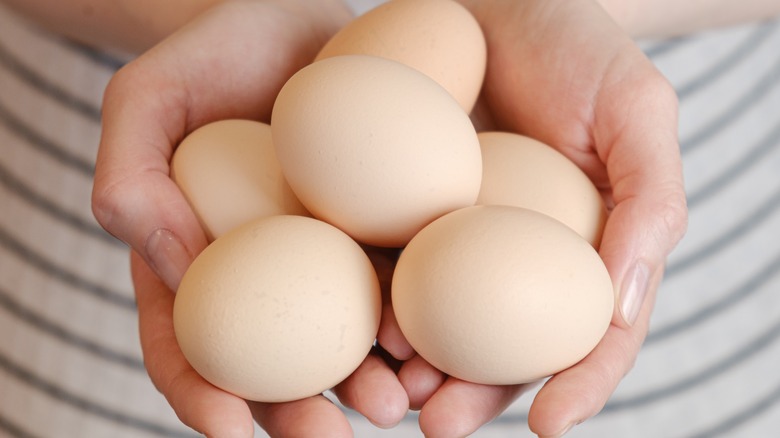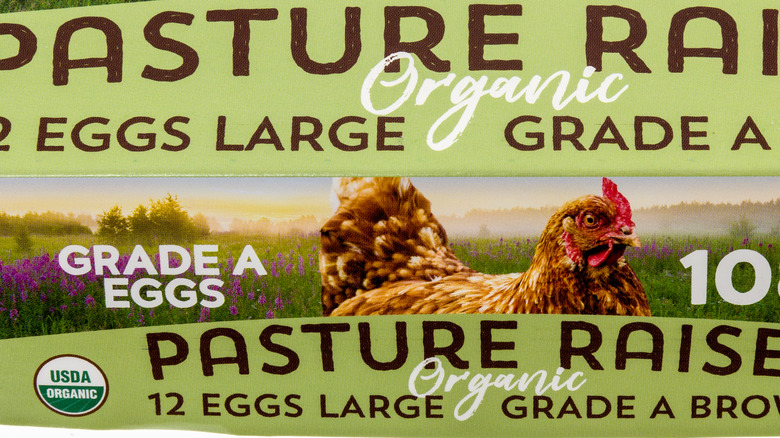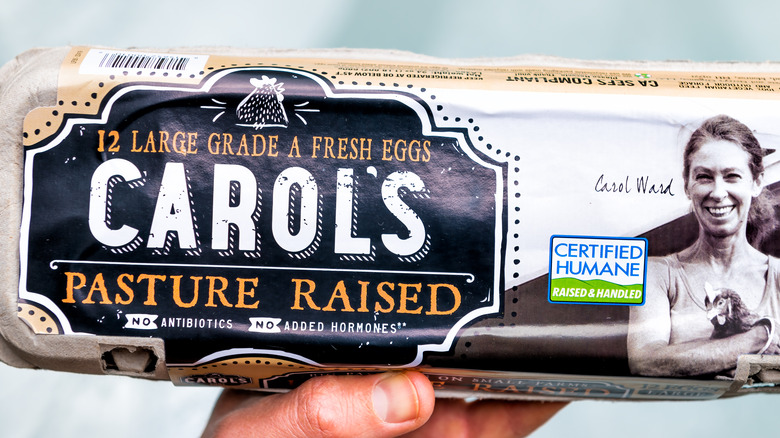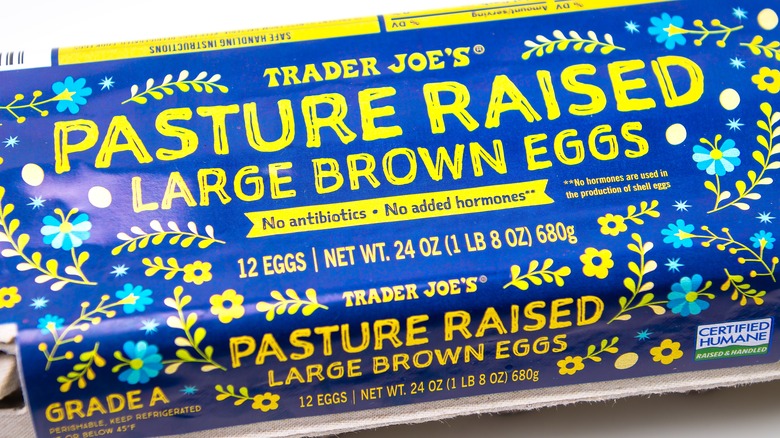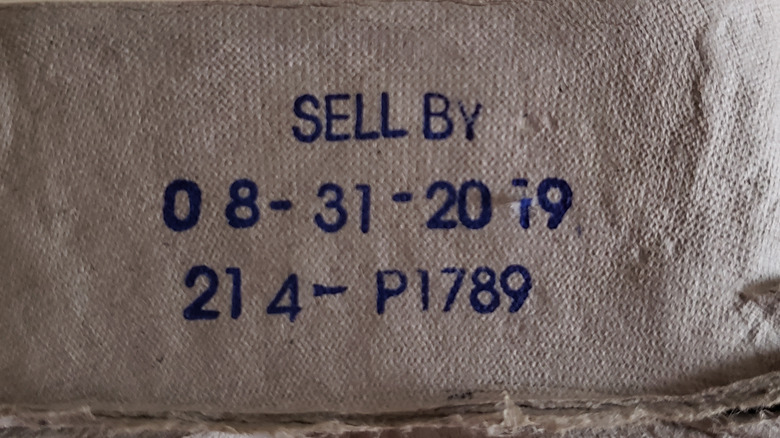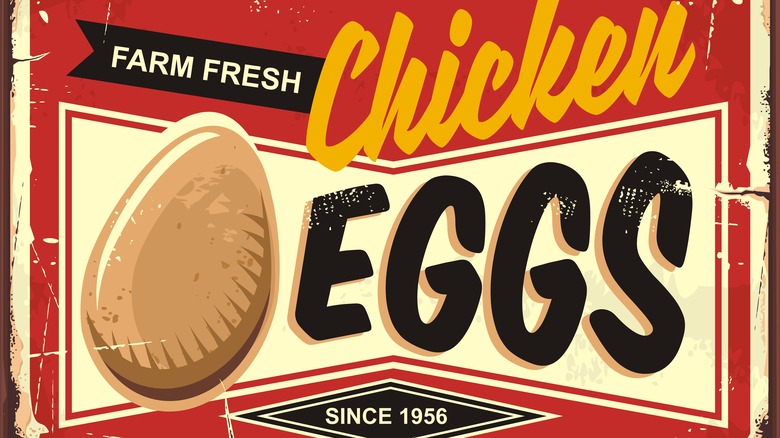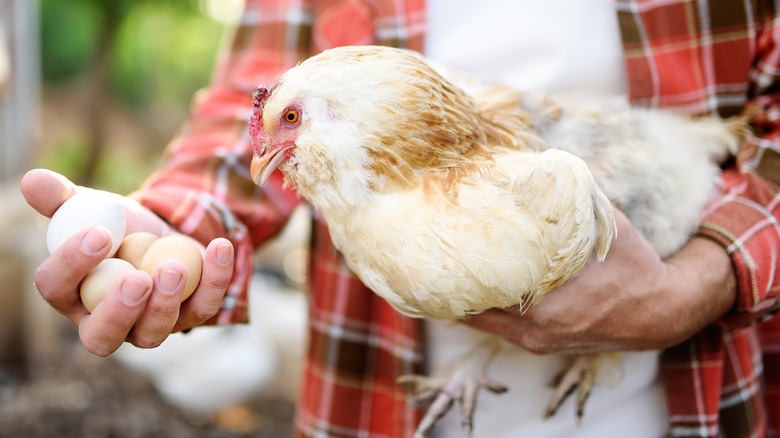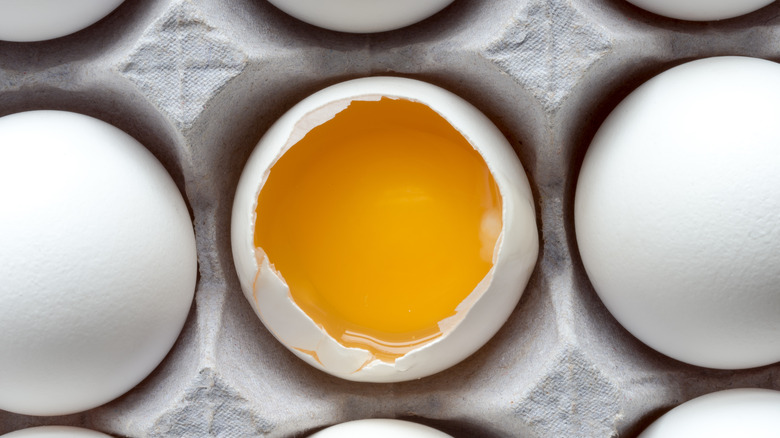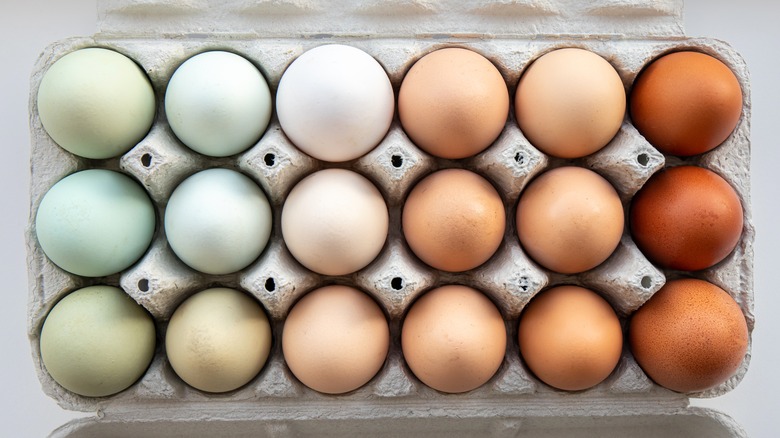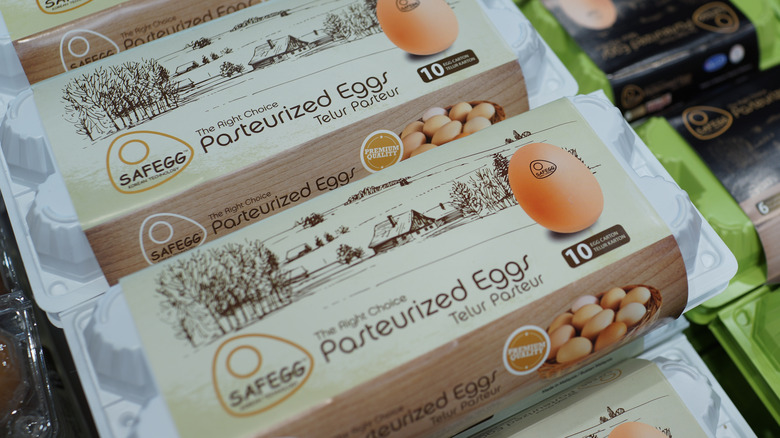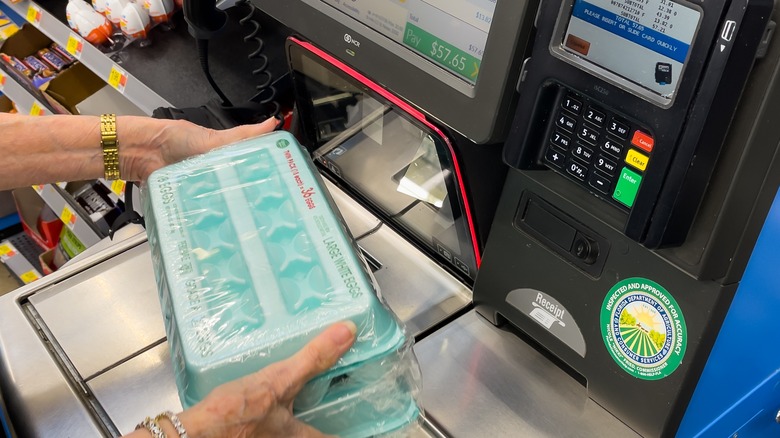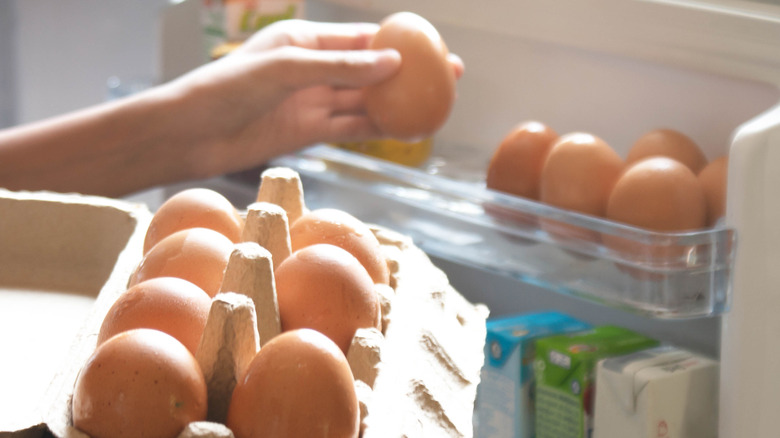Your Essential Guide To Buying Organic Eggs At The Grocery Store
Eggs are one of the most important foods stocked in the fridge. They make a quick, easy (and affordable) meal — and can be cooked in dozens of tasty ways. Eggs are also a nutritional powerhouse, filled with protein and loads of other essential vitamins and nutrients, making them perfect for helping to keep our bodies healthy. And if all that weren't enough, they're an essential ingredient in so many other foods we make at home, from baked goods to meatballs to crispy, golden veggies fried in an egg-based breading.
In fact, eggs are such a beloved part of our culinary landscape that farmers produce more than 100 billion eggs in the United States annually. Even more remarkable: The average American eats an estimated 280-plus eggs each year. That's a lot of omelets. But despite that popularity, it's worth noting that all eggs are not created equal. Whether you're concerned about animal welfare and chickens living in the most humane conditions possible or you believe in supporting sustainable and environmentally-friendly farming practices, there are many reasons to opt for organic eggs when shopping.
As an added bonus, organic eggs aren't just better for the planet and the chickens that lay them — they can also sometimes pack significantly more nutrients like omega-3 fatty acids as well, making them a win-win all around. Ready to learn more? Here's how to buy the best organic eggs on your next grocery run.
Look for the USDA Organic seal
Whether you're shopping in a big box retailer, your local chain grocery store, or a specialty health food market, the first step in buying organic eggs should be checking the carton for the USDA Organic seal. This green and white circular logo should be printed somewhere on the egg carton. If it's not, put the eggs back and look for another brand.
To carry the USDA Organic seal, eggs must meet a number of rigorous organic standards set by the U.S. Department of Agriculture. These standards cover the living conditions of the chickens that produce the eggs, their diet, their exposure to all types of chemicals, and more. The chicken's feed in particular is studied before the seal is awarded. The chickens must eat a diet free of synthetic pesticides, herbicides, and genetically modified organisms. Farmers commit to these guidelines under threat of large monetary fines, and their farms are frequently re-certified by independent third-party agencies to make sure the information they are providing is accurate and the eggs qualify as being 100 percent organic.
Fun fact: While the trend toward organic eggs might seem like a recent idea, Congress passed the Organic Foods Production Act which led to the creation of the USDA Organic seal in 1990.
Check for other certifications too
In addition to the USDA Organic seal, spend a couple seconds looking at what else is printed on the egg carton before committing to buy. One additional logo you might see is the "Certified Humane" seal which is awarded by Humane Farm Animal Care, an international nonprofit organization committed to "improving the lives of farm animals," as they note on their website. In addition to tracking what the chickens on a farm are fed and what chemicals they may or may not be exposed to, Humane Farm Animal Care is especially concerned with the life of the chickens laying our eggs. According to their guidelines, in order to be awarded a "Certified Humane" seal, "Animals are never kept in cages, crates, or tie stalls. Animals must be free to do what comes naturally. For example, chickens must be able to flap their wings and dust bathe, and pigs must have space to move around and root."
The guidelines are updated regularly as needed and were created by the organization's governing body — a 40 member committee made up of scientists and veterinarians from the United States, Europe, Canada, and South America. The seal is used on approved organic egg packaging in all of these regions.
Make sure the eggs are hormone-free
As you become familiar with the egg carton in your hand, the next thing you might notice on the package is wording stating the chickens that laid the eggs were not given antibiotics or added hormones. For starters here, it's helpful to know that the Food and Drug Administration prohibits the use of hormones in chicken production in America, so you might see an egg carton saying "no added hormones" even on eggs that aren't organically raised. Don't let that language alone fool you — if you see a "Certified Humane" seal or the USDA Organic seal, then you know the eggs are actually organic.
Similarly, some cartons will also proclaim that the eggs inside are free from antibiotics. The use of antibiotics is a health concern for some consumers — they don't want to be exposed to any potential medications or drugs that chickens were on while they were laying eggs. If you see this term on your egg carton, you're safe in knowing the chickens that laid your eggs never got sick and were never treated with antibiotics. Chickens that do become ill for whatever reason and are given antibiotics in order to help them heal and recover are removed from their current flock and put in another group with other chickens that have been sick in the past. These chickens still lay eggs after they've recovered — the eggs just can't carry the "No Antibiotics" claim.
Check the carton for any packing codes
Once you've found all the seals and information explaining how your organic eggs were produced and what kind of conditions the chickens laying them live in, the last thing you need to check is the freshness of the eggs themselves. Examine the carton for some words and numbers that have been stamped onto it — nothing that was printed on the box in advance. This is the data you need to work with. The most notable part of this stamp, and the information that's the easiest to understand, is the "sell by" date. The date is included for retailers so they can monitor their stock and inventory and make sure they actually sell their fresh organic eggs by the date listed.
In addition to a "sell by" or "use by" date, you will also see an additional set of data — typically a three-digit number followed by a few additional letters or numbers. The three-digit number is what's called a Julian date. This number represents the day of the year when the eggs were packaged. Each day of the calendar year is assigned a number. January 1 is 1, February 1 is 32 — because it's day 32 of the calendar year — and December 31 is 365. Following this number, the next bit of information is the code for the farm where your eggs were produced, which can be very useful data for health officials tracking outbreaks or other potential medical scares.
Don't be swayed by misleading language like Farm Fresh
As you scour and examine egg cartons looking for seals and numbers and other bits of useful information that will help you to buy a quality batch of organic eggs, you may also come across a wide variety of additional terms. "Farm fresh." "All natural." "Locally raised." Don't let this added fluff draw you in or influence your purchase. It's just marketing language and it doesn't actually have anything to do with the quality of the eggs you are buying or whether or not they were raised organically.
"Farm fresh" in particular is a huge misnomer because technically, all eggs are raised on farms. There's nothing quantifiable or measurable at all in terms of what this wording means. It's pure marketing. Similarly, while the word "local" might imply freshness or that the eggs are better because they come from somewhere near your home, this word on it's own is purely there to promote a sale. Without any additional facts, it doesn't make the eggs organic, or better.
Finally, any language touting that the eggs in your hand are "natural" or were "naturally laid" or "raised" is also completely misleading and meaningless. The process of a chicken laying an egg is a natural phenomenon, so it can always be described as natural. But that term doesn't mean the eggs are better. Nor does it mean that the chickens on the farm are treated humanely — or that their eggs are organic.
Opt for cage-free or pasture-raised eggs if possible
While a "USDA Organic" or "Certified Humane" seal might clue you in that the eggs you're buying don't come from a chicken that is forced to spend its entire life in a cage, you still won't know exactly what that chicken's life is like until you do some digging around. Most egg providers detail their birds' living conditions in some way on their egg carton packaging, but those definitions can vary widely.
For instance, you might see "cage-free" printed on the carton. However, this doesn't mean the chickens are running around the farm having a great time. In reality, "cage-free" eggs typically come from chickens housed in large indoor sheds and barns. They have freedom to move around, perch, and lay eggs in nests but their access to outdoors is usually severely limited. In contrast, "free-range" eggs typically come from chickens with some combination of indoor and outdoor access — usually an open yard-like space but also sometimes a grassy area.
Chickens that are living their best life tend to be "pasture-raised." This means that they have the greatest access to outdoor areas and are able to roam and forage as desired, enjoying ample access to natural sunlight and fresh air. That said, keep in mind these definitions vary by farmer and region, so there is some inherent fluidity in terms of how your specific carton of eggs was likely produced.
Check the grade and quality of the eggs
Most of us know to immediately open the egg carton and look for any potential breakage before we buy. But in reality, that's just the first of several things you should be checking before you make any egg purchase. In addition, take a second to examine the eggs in your carton, looking closely at their shells for any cracks, holes, or unusual discolorations. A clean, unblemished shell is a sign of good quality. Take a whiff as well. If you notice any smells, put the eggs back and get another carton. Fresh eggs should always have a neutral or faintly earthy smell — nothing else. Unusual or foul odors are an immediate sign something is wrong and eggs may have spoiled.
Open a couple different cartons and see if you can spot any differences in egg size and condition. Grade AA eggs are the highest quality egg. This applies to organic eggs and regular eggs alike. These eggs are expected to have thick whites and luscious, round yolks when cracked. The shells should appear clean and unblemished. Grade AA eggs can come in five sizes: jumbo, extra large, large, medium, and small. After Grade AA you get Grade A eggs. The biggest difference between the two is that Grade A whites will be slightly thinner and the yolks not quite as plump. Finally, eggs also come in Grade B. These eggs tend to be used commercially and are rarely sold in stores.
Mix it up when it comes to shell color
Part of the beauty of buying organic eggs is that it opens you up to a much wider variety of egg providers. Instead of giant, mass market farms that supply eggs to countless locations, you might instead be patronizing a smaller, local family-owned farm. And that might also mean you get to start buying a rainbow of different colored eggs — not just white or even brown but also tan or even light green or blue in some cases. The options can be truly beautiful at times — like Easter without the food coloring!
All this natural variety in egg shell color is due to a fact that many people aren't aware of: Different breeds of chickens actually lay different colored eggs. While white eggs tend to be the variety most commonly sold (because the chickens producing them — white leghorns — are small, hardy, and prolific layers), there's a rainbow of different colored eggs out there to sample and explore.
In addition to varying shell colors, organically grown eggs tend to have thicker, higher quality shells. And the color of those egg shells can also be impacted by the birds' diet. Chickens eating marigold petals might lay more yellowish eggs while chickens that eat beet root on the farm will lay eggs with a purple tint. Older chickens also tend to lay more darker colored eggs than a younger chicken's eggs — another benefit of organic farming since organically-raised chickens tend to live longer.
Buy pasteurized eggs if you want — they can still be organic
Imagine: You're cooking a special meal and plan on making your own homemade Hollandaise sauce. Or maybe you're making eggnog or beef tartare or even a decadent French vanilla ice cream? In all these cases, there's a chance you'll be eating raw or undercooked egg. To reduce your risk for foodborne illnesses like Salmonella that you can get from that raw egg, it's always a good idea to buy pasteurized eggs as a safety precaution. And if you prefer organic eggs, rest assured knowing that it's definitely possible to get an organic egg that has also been pasteurized! The two concepts are not mutually exclusive.
To pasteurize any egg — organic or otherwise — without removing it from its shell, the egg is simply placed in warm water to a specific temperature. The water is warm enough to destroy potential bacteria but it doesn't cook the egg or impact its flavor or quality. Both regular eggs and organic eggs can undergo pasteurization. And if you pasteurize an organic egg, it will still be organic after the pasteurization process. Need another reason to consider buying pasteurized organic eggs? We've got three undeniably tempting words for you: raw cookie dough!
Plan to pay a bit more
As we've all seen, egg prices can be pretty volatile. They go way up sometimes and then they can drop back down just as quickly. But while the price of regular eggs is frequently shifting, it's always safe to assume that you're going to have to pay more for organic eggs. In general, that price can be about 50 percent higher to twice the price of a standard dozen. But with the added benefits you're getting from organic eggs — increased flavor, better quality, and a happier life for the chickens that are laying them — that small bump in price is worth it for some people.
It's also important to note that the extra price for organic eggs isn't price gouging. It generally does cost more to get a chicken to lay organic eggs. There's the added expense of the outside land the chickens get to roam and its maintenance, plus the cost of high-quality organic chicken feed. It's also more expensive and requires more labor to harvest organically raised eggs, and the farmers operating the farms also have to pay for certifications and inspections which make these farms more expensive to operate that traditional non-organic chicken farms.
But whether you're just scrambling a few eggs, poaching or deviling your eggs, or you're making Silky Egg Drop Soup or a Sri Lankan Egg Hopper, the price of buying organic is easy to justify — especially when you're making an egg-based meal that truly shines!
Store your eggs correctly
Got your organic eggs in hand? Now comes the fun part: storing them properly until you get to cook with them! If you plan on using the eggs soon and the available space in your fridge is tight (like around the holidays when you might have ingredients for dozens of different dishes on hand), you can store your eggs at room temp. Left on the counter, organic eggs will last around a week without going bad.
If you intend to store your eggs in the fridge, they'll last much longer — typically around three to five weeks beyond their "expiration" or "sell-by" date. Eggs should be kept in the main section of your fridge and not the door. This helps to reduce temperature fluctuation that shortens their shelf life. You can also make your eggs last longer by storing them upside down — broad end up and pointy end facing downward. This helps to keep any air bubble that's found within every egg at the broad end of the egg and will also help to keep the yolk centered within the shell.
This goes for all eggs, not just organic ones: Avoid washing eggs before storing them — it helps to keep out bacteria. Buying new eggs and still have a few older ones left? Grab a Sharpie and mark the old ones so you can easily tell them apart! Wondering if your eggs are still fresh? Put 'em in a bowl of water — fresh eggs sink while spoiled eggs float.

